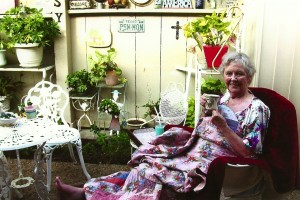Patsy talked about her last real meal. The evening before going to the hospital with abdominal pain and vomiting, she enjoyed a home-cooked meal at her niece’s, complete with vegetables picked from the garden that day. After that evening, and for the 10 weeks until her death, she never had another home-cooked meal, or another meal of any real substance for that matter. For two weeks eating consisted of a few bites of hospital food. Once back home, her meals were never more than a few bites or sips of whatever she thought she could get down; soup, ice cream, applesauce, and other such things.
I watched several “last times” take place over those weeks. Most, I’m sure, went undetected. Some were obvious.
She got dressed up for the last time when her minister came to visit. With great effort she and Judy got her from her nightgown into green pants and a black and green and silver top. She put on her makeup, fixed her hair, and, despite being noticeably thinner, she looked as healthy and vibrant as she had weeks before. Being dressed up perked her up. She smiled and laughed more than she had in days, but she practically collapsed from exhaustion once the minister was out the door.
 Patsy loved sitting on her patio in the mornings. For several weeks, when the mornings were cool enough, we sat out there, drinking coffee, reading about the Texas Rangers’ latest collapse, and enjoying the multicolored oasis she had created with her tiny gardens and potted plants. Those morning visits dwindled over time from more than an hour to just a few minutes. And then the patio time simply stopped. It was just too hard. She did not know that last morning enjoying her patio was the last. She simply stopped asking to go out. Then the final time she saw the patio she loved so much was when Judy helper her to the car on the way to the Hospice Center.
Patsy loved sitting on her patio in the mornings. For several weeks, when the mornings were cool enough, we sat out there, drinking coffee, reading about the Texas Rangers’ latest collapse, and enjoying the multicolored oasis she had created with her tiny gardens and potted plants. Those morning visits dwindled over time from more than an hour to just a few minutes. And then the patio time simply stopped. It was just too hard. She did not know that last morning enjoying her patio was the last. She simply stopped asking to go out. Then the final time she saw the patio she loved so much was when Judy helper her to the car on the way to the Hospice Center.
Her last visit to her patio was also the last cup of coffee she enjoyed. Coffee was a vital part of her morning ritual. It had become my job to brew it, prepare it her way, and bring it to her on the patio. She drank in the full visual and visceral experience with each sip. Sadly, when the fear of throwing the coffee up became greater than the enjoyment of drinking it, she stopped.
(Image of photo wall at left) That trip to the Hospice Center was the last time she saw her condo, a spectacularly decorated two-bedroom place that had far too much furniture and dozens of pictures adorning every wall. On her way out, she stopped and looked at the wall with all the family pictures, then paused at the door to turn and take in the beauty of her living room. Another last time.
Her last night in her own bed was her last good night’s sleep. Once at the Hospice Center, she complained of the mattress and pillows. We did bring her pillows from home, but the mattress never got any more comfortable.
“Last times” were happening everyday without our realizing it. The last time she walked on her own from the bedroom to her recliner in the living room, the last time she stood on her own, the last time she put on her own makeup. In fact, given the sudden turn of events and decline in health, she had been having “last times” for weeks. Without realizing it, she had already attended her last choir rehearsal. Weeks before she had donned her robe, made the walk from the choir room to the sanctuary, and stood in her place for Sunday worship for the final time. She had already shared her last martini with Frank. She didn’t know that her drive to her sister’s house would be the last time to ever drive a car. Hundreds of “last times” had taken place outside her awareness.
When her grandchildren came to visit, she knew it would be her last visit with them. When an old friend drove 5 hours to see her, she knew she would never see him again. Those were powerful, tender moments. Patsy knew what was ahead and she dared not pretend otherwise and let them slip away. She laughed and cried and said what she needed to say.
 What if we knew when our “last times” for things would be? How different would my life be if I knew an encounter or an event would be a “last time?” How much would I savor my morning cup of coffee if I thought it would be my last one? Would I treat my moments with Judy differently if I assumed one of us would not be there the next day? How about even a chance encounter with a stranger? How would I spend my evenings differently if I took seriously the child’s prayer, “if I should die before I wake?”
What if we knew when our “last times” for things would be? How different would my life be if I knew an encounter or an event would be a “last time?” How much would I savor my morning cup of coffee if I thought it would be my last one? Would I treat my moments with Judy differently if I assumed one of us would not be there the next day? How about even a chance encounter with a stranger? How would I spend my evenings differently if I took seriously the child’s prayer, “if I should die before I wake?”
I don’t know that such an awareness is possible. Knowing how I tend to worry, I can see how a sense of dread or desperation could easily encroach on my waking and even sleeping moments. “Oh no, this is it!”
But how amazing it would be to live with the mental and emotional nimbleness to fully embrace a moment as if it were the last time for that one thing, then let it go and move on to the next “last time.”
I was with Patsy when she took a breath in for the last time, and then let it go. She was a good teacher.
0 Comments until now
Add your Comment!